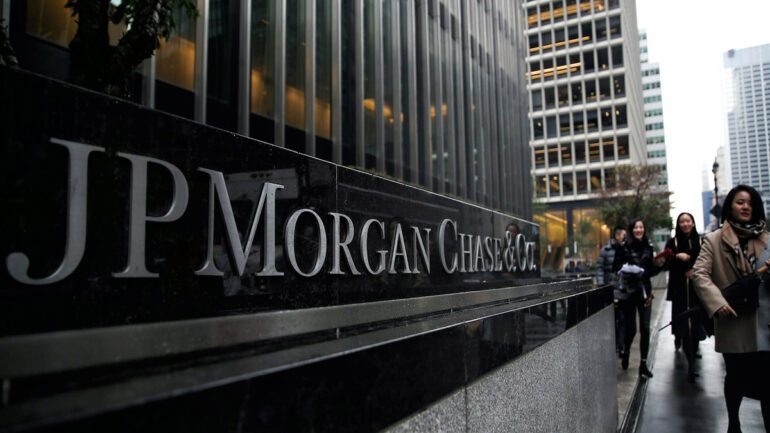TL;DR:
- JPMorgan is developing IndexGPT, an AI-powered tool for investment advice.
- The trademark application highlights IndexGPT as cloud computing software using artificial intelligence for tailored investment choices.
- JPMorgan has emphasized its commitment to AI, with 300 AI use cases already in production.
- The bank has developed an AI model that detects changes in financial policy and aids trading decisions.
- JPMorgan’s AI projects are progressing well, exceeding expectations and aiming to deliver $1 billion in business value.
- The bank has a strong team of 1,000 employees involved in data management, 900 data scientists specialized in AI, 600 machine learning engineers, and a specialized AI research group of 200.
- The financial industry is racing to develop AI applications, with Goldman Sachs and Morgan Stanley making notable moves.
- Several banks, including JPMorgan, have restricted the use of ChatGPT due to industry regulations.
Main AI News:
JPMorgan is making strides in the realm of artificial intelligence (AI) with its latest innovation, IndexGPT. The financial powerhouse recently filed a trademark application for this cutting-edge tool, signaling its intentions to utilize the power of AI to offer tailored investment advice.
IndexGPT, described as “cloud computing software using artificial intelligence” in the application, possesses the capability to meticulously select financial securities and assets, ensuring investment choices that align with individual customer needs. JPMorgan’s foray into AI-driven solutions comes as no surprise, as the bank has been vocal about its commitment to harnessing the potential of this technology.
In his annual letter to shareholders, JPMorgan CEO Jamie Dimon highlighted the bank’s ambitious plans for AI-backed tools, revealing that it already has a remarkable 300 AI use cases in production across various areas such as risk management, prospecting, marketing, customer experience, and fraud prevention. This emphasis on AI is further exemplified by the bank’s recent announcement of an AI model trained on decades’ worth of US Federal Reserve speeches. The model has the remarkable ability to detect potential changes in financial policy, empowering the bank to make well-informed trading decisions.
JPMorgan’s dedication to AI is paying off, as the bank’s executives reported significant progress on their AI projects. During its annual investor day, Lori Beer, the global chief information officer, disclosed that the bank is surpassing expectations and is well on track to deliver on its commitment to generating $1 billion in business value through AI. Such achievements underscore the bank’s profound understanding of the transformative power of AI in the financial sector.
To bolster its AI capabilities, JPMorgan boasts an impressive team of experts in the field. The bank has a whopping 1,000 employees dedicated to data management, ensuring the seamless integration of AI-driven solutions into their operations. Additionally, JPMorgan has 900 specialized data scientists who possess a deep understanding of AI and machine learning, complemented by a team of 600 proficient machine learning engineers. Furthermore, the bank has established a specialized AI research group comprising 200 talented individuals, further solidifying its commitment to pushing the boundaries of AI innovation.
The financial industry, recognizing the potential of AI, has embarked on a race to develop advanced AI applications. The introduction of ChatGPT in November acted as a catalyst for this industry-wide competition. Goldman Sachs responded by launching Louisa, an AI-based social networking platform, through its startup division. Similarly, Morgan Stanley struck a strategic deal with OpenAI, the developer of ChatGPT, granting its wealth managers access to cutting-edge GPT-4 technology.
However, amidst the AI frenzy, several banks, including JPMorgan, Citigroup, Bank of America, Deutsche Bank, and Goldman Sachs, have imposed restrictions on the use of ChatGPT by their employees. This cautious approach aligns with the industry’s standard practice of limiting the use of third-party software to mitigate potential risks and ensure compliance with regulatory requirements.
As JPMorgan continues to push the boundaries of AI, its development of IndexGPT underscores the transformative power of this technology in the financial sector. With tailored investment advice at the forefront, JPMorgan’s foray into AI showcases its commitment to leveraging innovative solutions that enhance customer experiences and drive business value in the ever-evolving digital landscape.
Conlcusion:
JPMorgan’s development of IndexGPT and its significant investment in AI highlights the transformative potential of this technology in the financial sector. The adoption of AI-driven tools for investment advice showcases the bank’s commitment to enhancing customer experiences and generating substantial business value. The race among financial institutions to develop AI applications further underscores the industry’s recognition of AI’s capabilities. However, restrictions on the use of third-party software demonstrate the need for caution and compliance with regulatory requirements in the rapidly evolving AI landscape.

